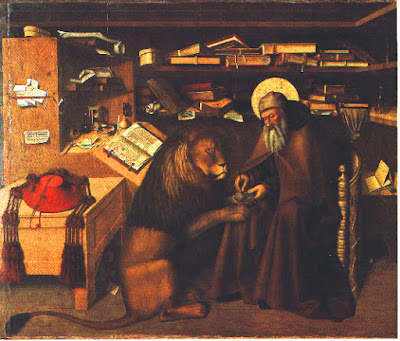St Jerome

You'd need to pay careful attention to detail to remove a thorn from the paw of a lion. St Jerome certainly had that ability in his scholarship and diligent work of Biblical translation and commentary. It is probably not true that he applied this skill to befriending a lion and removing the thorn from its paw. The lion story is a rather charming legend and this 15th century painting by Colantonio of Jerome in his study is fascinating. I love the expression on the face of a lion - almost like that of a worried little boy. "Is this going to hurt? Better not look. Hope he doesn't take too long." Looking at Jerome's face and that of the lion, I am reminded of Jerome's words, "The face is the mirror of the mind, and eyes without speaking confess the secrets of the heart." The painting is part of an altarpiece and all around Jerome are the tools of his trade as a scholar, linguist, theologian, translator and interpreter of Scripture. There is













